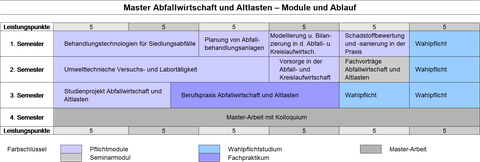Master of Waste Management and Contaminated Sites
Table of contents
The master's program in Waste Management and Contaminated Sites is accredited.
The Master Waste Management and Contaminated Sites is a German-language study program. More detailed information can therefore be found on the German web page.
Educational goals and career perspective
In the master's program in Waste Management and Contaminated Sites, students learn the sustainable use of resources, technologies for environmental pollution control and climate protection. Environmental engineers are trained to contribute to solutions of current environmental challenges, especially in waste and recycling management and contaminated site treatment.
The interdisciplinary study program offers students the opportunity to specialize in individual subject areas.
The fields of waste and recycling management and contaminated site treatment have developed into an important, independent environmental science due to the demands of modern industrial society.
The institute's research focuses on current issues in recycling management, which are dealt with in an interdisciplinary manner with the aim of sustainable resource use.
Graduates will find their fields of work in practice (production and disposal industry), municipalities, associations and planning societies, environmental and sustainability departments of industry and the public sector on issues of waste disposal, recycling and prevention, and in research and teaching in national and international research and higher education institutions. In economic structures, graduates are increasingly confronted with tasks such as conception and evaluation. Since the topic of circular economy is of great importance for every economic actor today, the transition into professional life can take place in almost all areas of economy and science.
Study contents and modules
In the master program, the compulsory modules will initially be expanded during the first two semesters. For the total of compulsory modules 70 credit points can be awarded.
The comprehensive elective catalog enables students to deepen their knowledge according to their personal interests and goals. The focus is on energy and process engineering, water and chemistry.
In compulsory elective courses, at least 20 credits must be earned. The exams take place during the course of studies.
The master thesis and a colloquium are part of the master's examination, which completes the course. It is written in the 4th semester. The processing time is 5 months. The aim of the work is the independent handling of a problem with scientific methods within a given deadline. A total of 30 credit points will be awarded for the Master Thesis and the Colloquium. The modularized training comprises a total of 120 credit points.

Modulschema Master AA
The exact module description can be found on the german website.
Study documents, appropriate institute and contacts
Study documents
The study and examination regulations as well as all other study documents can be found here. Please note that these documents or files are for your information. The study documents published in the official announcements of the TU Dresden are legally binding.
Appropriate institute
Institute for Waste Management and Contaminated Sites
Contacts
In case of any questions concerning the study cours please contact the study counselling, the Faculty Students' Council (FSR), the study course coordinators or Benjamin Schwan, M.Sc.
Study requirements
This Master programme is a German-language study programme. More detailed information can therefore be found on the German web page. To start this Master programme, sufficient previous knowledge in the field of Waste Management, Contaminated Sites, Hydro Sciences and Engineering are required. The application deadline for EU citizens is 01.04.-30.06. each year and for non-EU citizens 01.04.-31.05. each year. Here you ca find further informations about the study possibilities at the TU Dresden, application, necessary language skills and students' life in Dresden.
